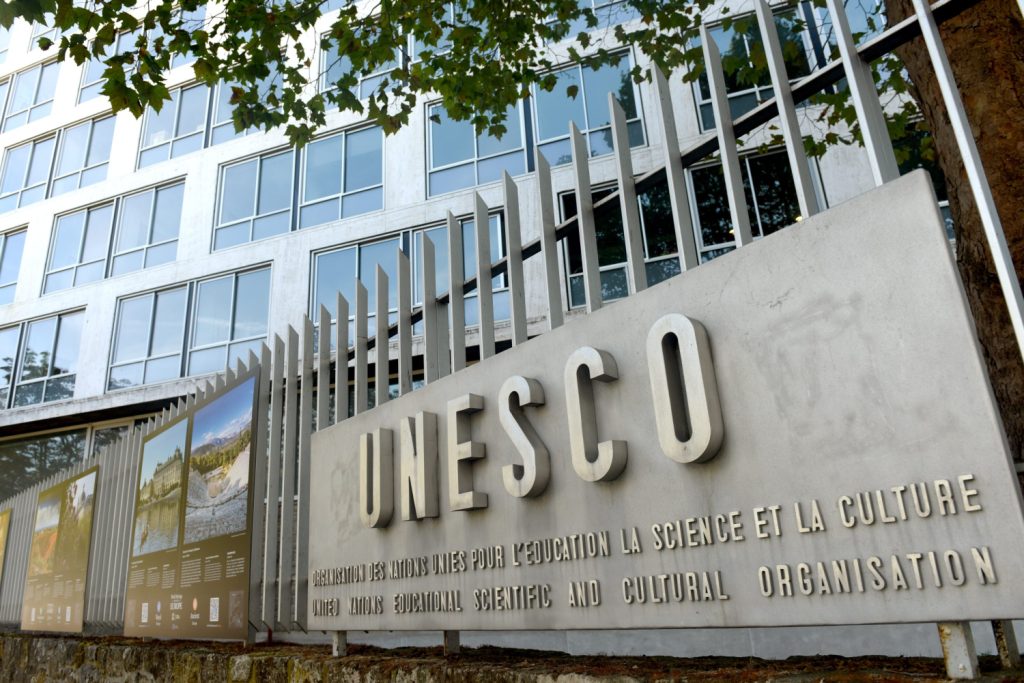IN THE MEDIA
The US and its influence in UNESCO
July 7, 2023 | Justin Amler

The Algemeiner
After a six-year absence, the United States has rejoined the United Nations Educational, Scientific and Cultural Organization (UNESCO) which it dramatically left in 2017 over its anti-Israel bias.
Despite objections from the usual suspects including Russia, the Palestinians, North Korea, China, Indonesia, UNESCO’s governing board enthusiastically and overwhelmingly voted 132-10 to allow the United States to rejoin the UN Agency.
This was no doubt influenced by the US commitment to pay US$600 million in arrears owing to UNESCO, after previously contributing almost a quarter of its $US535 million annual operating budget.
UNESCO’s purpose is supposedly to “use… education, science, culture, communication and information to foster mutual understanding and respect for our planet.” However, being part of the United Nations apparatus means it’s subject to the same politicization and bias as other UN organisations including the UN Human Rights Council, the General Assembly and the World Health Organization.
In 2011, it became the first UN body to recognize “Palestine” as a full member state – a move that led both Israel and the United States to withdraw funding in protest.
This was seen as a victory for Palestinian intransigence, emboldening them to continue seeking all the pomp and trappings of statehood without the requirements and obligations. More importantly, it was an important milestone in their campaign to bypass direct negotiations with Israel and have the international community “validate” their statehood instead.
The Palestinians wasted little time using their newfound “legitimacy” to make a series of submissions claiming sites for heritage status, such as the Qumran Caves where the Dead Sea Scrolls were discovered and Shechem (modern-day Nablus) and the surrounding areas, including the shrine of the Biblical patriarch Joseph known as Joseph’s Tomb. Incidentally, despite the Oslo Accords stipulating that the Palestinian Authority has responsibility for the site’s security and that Jews have unhindered access to pray there, Jewish worshippers have come under regular attack and the site has been vandalised by Palestinians numerous times over the years, including just this week.
Over the next few years, UNESCO continued to pass a series of disgraceful resolutions against Israel culminating in 2017 when, quite cynically on Israel’s Independence Day, resolutions were passed disavowing the Jewish people’s connection to Jerusalem, claiming Israel has no legal or historical rights in Jerusalem. Israel was also angered by the passing of resolutions that claimed the Tomb of the Patriarchs in Hebron, the revered burial place of Jewish patriarchs and matriarchs, should be classified as a Palestinian world heritage site in danger. It also referred to the city as “Islamic” absurdly denying thousands of years of Jewish connection to the site.
This blatant attempt to rewrite history was the final straw, resulting in both Israel and the United States making the decision to leave the organization completely.
Over the ensuing years though, despite these resolutions remaining, there has been some cause for cautious optimism. The election in October 2017 of Audrey Azoulay, a Jewish former minister of culture in France, as Director-General was cautiously welcomed by Israel and the United States. Azoulay made attempts to persuade both countries to reconsider their withdrawals, including by trying to depoliticize the organization around the Israeli-Palestinian conflict and seeking to soften or delay the anti-Israel resolutions.
These efforts appear to have borne fruit, as Israel in turn had already indicated last year that it was not opposed to the US rejoining the international body. It should be noted though that a large part of the reason the US has decided to reengage with UNESCO is to counter the growing influence of China.
Azoulay, for her part, welcomed the US’s return to UNESCO, hailing it as a “great day for UNESCO and for multilateralism.”
UNESCO, indeed, has an honourable goal of preserving and protecting historical world sites of great significance to all of humanity. But it has, unfortunately, also served as the perfect conduit for the cultural and historical attacks launched by the Palestinians and their allies in their continuous and ongoing efforts to rewrite history by delegitimizing and removing the almost 4000 years of Jewish connection to the land, effectively erasing Israel from the pages of history.
As George Orwell said quite famously, “Who controls the past, controls the future.”
It is unclear how significant a role the US will play in its return to the world body or the influence it will be able to exert, or even if it will be able to make a positive impact to temper the current anti-Israel bias. Will it succeed, or will it be more of the same old tune played by the same old orchestra led by the same old Palestinian conductor?
Because as George Orwell also said, “Who controls the present, controls the past.”
We wait to see.
Tags: Israel, Palestinians, UNESCO, United Nations, United States





